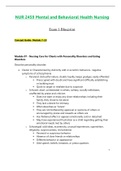1 NUR 2459 Mental and Behavioral Health Nursing Exam 3 Blueprint Concept Guide - Module 7 -10 Module 0 7 - Nursing Care for Clients with Personality Disorders and Eating Disorders Describe personality disorder: Cluster A: Characterized by distinctly odd or eccentric behaviors - negative symptoms of schizophrenia o Paranoid : distrustful nature, doubts loyalty, keeps grudges, easily offended Preoccupied with doubt and have significant difficulty establishing or building trust Quick to anger or retaliate due to suspicion o Schizoid : aloof, uninterested in others, solitary, socially withdrawn, unaffected by praise and criticism Does not want or enjoy any close relationships including their family, they chose to be alone They lack a desire for intimacy Often describes as “loners” They are not bothered by approval or opinions of others or encouraged by praise and rewards as others are Has flattened affect or appears emotionally cold or detached May have experienced frustration as a child regarding getting their emotional needs met by others o Schizotypal : odd ideas, eccentricity, unusual experiences, superstitio n, religiosity, suspiciousness, reclusiveness Paranoid vs suspicious behavior Absence of close friends or relationships Different behavior or appearance Odd speech, beliefs, fantasies, or preoccupations 2 Discomfort in any type of social situation Inappropri ate to slight display of feelings o Nursing Care Establish trust Do not challenge client’s ideas or beliefs Distance Nursing approaches vary when a personality disorder is identified, depending on the specific needs and concerns of the patient o Nursing assessment How the patient is interpreting the situation o Nursing interventions: clear communication, set expectation, avoid laughter Cluster B: Characterized by overly dramatic, emotional, or erratic behaviors o Borderline Severe impairments in functioning , most erratic and dramatic of all personality disorders Emotional lability Impulsivity Self-destruction behaviors Antagonism Splitting: inability to view both positive and negative aspects of others as part of a whole Idealize a person at the beginning of a relationship, but at the first disappointment, the individual’s status shifts quickly to one of devaluation Criterial for BPD Frantic efforts to avoid real or imagined abandonment A pattern of unstable and intense interpersonal relationships (alternating between idealization and devaluation) Markedly and persistent unstable self -image Impulsivity in spending, sex, substance abuse, reckless driving, binge eating Recurred suicidal behavior, gestures, threats or self -
mutilation Affective instability Chronic feelings of emptiness Inappropriate, intense anger or difficulty controlling anger Transient, stress -related paranoia ideations Nursing interventions 3 Encourage the client to examine behavior Help the client realize you are available without reinforcing dependence Rotate staff members to avoid client dependence on a particular individual Recognize if the client is playing one staff member against another (splitting) With the client, explore feelings of abandonment (clinging and distancing) Assist the client to work towards “object constancy” without promoting dependency o Narcissistic Exaggerated achievement and talents; has an exaggerated sense of self importance Believes that unlimited success, power, money, beauty, or ideal love are due t o them Grandiose sense of self Is not able to identify with the needs of others, lacks empathy Believes that others are envious of them and does not understand that they may not be May be arrogant, haughty, or condescending o Histrionic Needs to be the cente r of attention May be inappropriately sexually seductive, or provocative in interactions with others Emotion ship rapidly in appear to be shallow Uses figures physical appearance to draw attention to themselves Speech is very impressionistic and lacks deta il Very dramatic, theatrical, and exaggerated in emotional expression Is easily influenced by others or by circumstances Believes that relationships are more intimate than they really are o Antisocial Repeatedly performs acts that are grounds for arrest has no regard for the law Repeatedly lies, uses alliances, or cons others deceitfulness Either does not plan ahead or acts impulsively Repeatedly engages in fights or assaults because of irritability and aggressiveness Does not care about their own safety or the safety of others




